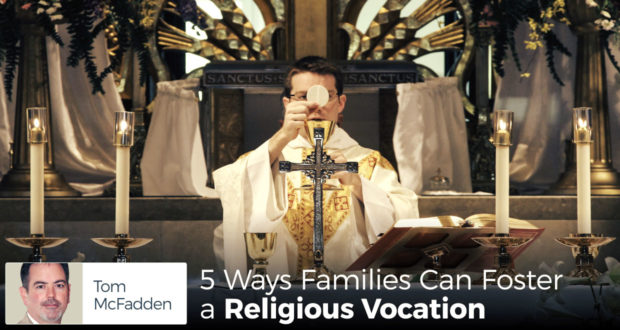Summary
I have five personal insights to share with you if you’re interested in fostering a religious vocation among your children.Okay, I will admit it—I’m not exactly an expert on the subject. But, at this point in history, it is tough to say if anyone is an expert on the subject.
There seems to be a shortage of young people answering God’s call to the religious life, and it appears that gone are the days of the Martin family who produced an extraordinary number of vocations in their family.
What do I know about fostering religious vocations? Maybe not much more than many others, but I can say that my eldest son, John, recently made his First Profession for the contemplative Benedictine order of monks affectionately called the Clear Creek Monks, in Hulbert, Oklahoma.
He was homeschooled as a youth, attended Christendom College, and then, following graduation, became a postulant with the order.
So, at least for now, I have my own insights that I would like to share with you if you are one of those families interested in fostering a religious vocation among your children.
1. Pray and Encourage.
Although seemingly obvious, it is important to pray as a family for vocations—that your children know them, and do them. And then, once someone has expressed an interest in a religious vocation, encourage him or her to pursue this calling.
Unfortunately, I hear stories of families who have a child who has expressed an interest in the religious life, but, due to not wanting to pressure him into it, they basically avoid any type of encouragement or discussion of the matter.
When my son was four years old, he told us that he wanted to be a priest. From that day on, we prayed, as a family, for vocations, and that our children might find their way into the priesthood or religious life, if that was God’s will.
By avoiding the topic of religious life with them because of fear that you will turn them off, it’s doing them a big disservice, in my opinion.
Which leads to tip #2.
2. Meet ‘n Greet.
Make sure your children meet and interact with priests and religious. Make sure they have some type of understanding that there are many options in the field of religious vocations. Encourage them to read stories about this or that religious saint. Have them write letters to priests or religious in various communities.
Go to your diocese’s ordinations or professions of religious. Many men and women who find their religious vocations make mention of a particular priest or religious who had an influence on them. I work with students at Christendom College, helping them to discern which type of career field they wish to enter.
I always advise them to reach out to alumni and friends in the various career fields to discuss the nature of their business, so that they can gain deeper insights into their lives. The same can be said for the religious or married life.
When my son was 6 or 7, he read a book about St. John Vianney, the patron saint of parish priests. One day we were talking, and we said, “Do you want to be a priest like St. John Vianney some day?”
He looked at my wife and me and simply said, “No.”
We were taken aback. We thought, “St. John Vianney is the best example of a parish priest you can find; what’s the deal with our son? Has he lost his way?” So we asked him, “Why not?”
He said, “I want to be a priest like Fr. Kleinmann.” It made perfect sense. Fr. Kleinmann was the parochial vicar at our parish, and he was the real deal for our son John. He was an actual priest for whom John could serve Mass and be around and see as an example.
Thank you Fr. Kleinmann!
3. Live the Liturgical Life of the Church and the Family.
The Church, as our mother, knows what she is doing. Throughout the year, she has days set apart for partying and celebrating, days set aside for sacrifice and penance, and some days that are just ordinary.
Reading the lives of the saints on a daily basis, and celebrating your children’s particular feast days are wonderful ways to help your children go “all in” on the Faith.
Doing various activities such as having special meals or desserts for the major liturgical seasons or taking off school for your family members’ baptism and other sacramental days can be a good opportunity for your children to appreciate the liturgical life of the Church.
This is important because every priest or religious is immersed in the liturgical life of the Church more so than most non-religious. Getting an understanding of it early on—beyond just Christmas, Easter, and Pentecost—can truly be a great help.
4. Keep the Culture at Bay.
This, in my opinion, is possibly the most important of all the points I want to make. Today’s secularized culture is eating away at innocence, purity, and holiness. If you want your children to embrace holiness and a religious vocation, then do your best to not allow your children to become secularized.
They need to be in the world, but not of the world. And this is very hard to do. This does not mean that your children cannot sing, dance, listen to music, watch movies, view TV, or surf the net, necessarily, but it does mean that it all has to be appropriate for them and not harmful to their spiritual lives.
As a matter of interest, my family does not have the internet at home. And of course, the biggest of all the vocation killers, in my opinion, is pornography. Once a boy sees immodest or pornographic images or videos, it is very hard to remove those thoughts and scenes from his mind, and this can, single-handedly, be the reason that your son, who once seemed so into becoming a priest or religious, totally turns away from this calling. It’s that serious.
5. Homeschooling and College.
This final point overarches all the other points that I have made. Through homeschooling, you, as parents, can have much more sway over your children—their academic education, their social lives, their extra-curricular activities, their friends, their spiritual lives, and their free-time.
In short, you can be a real influence on them, much more so than if they attended a brick-and-mortar school. Also, where your children go to college can deeply affect their call to the religious life.
Many Catholics go to college and lose their faith. This is a fact. Going to college is the number one hazard to your children practicing the Faith. And if losing one’s religion is such an easy thing to do, it is probably even easier to lose one’s vocational calling to the religious life. And it’s no wonder.
The culture on so many college campuses is simply contrary to the good moral life. And parents are paying for their children to experience this. I find that amazing. But a school such as Christendom College actually helps students find their vocations—whether to the priesthood, religious life, or married life.
Christendom College and a select few other colleges encourage students to embrace holiness and strive for excellence and greatness in all that they do, including finding their vocations.
It is no wonder that, over the past 38 years, Christendom College has seen 75 alumni choose the priesthood or religious life, while 49 women have said yes to a life as a bride of Christ. And there are currently 27 Christendom alumni studying for the priesthood, with the majority of them having come to Christendom from a homeschooled background.
These are my opinions and reflections as a homeschooling father of ten children, married to my beautiful wife of nearly 25 years, and as someone who has been working at Christendom College for the past 15 years.
Although I have no insights into the vocational choices of my next 9 children, I do know that they will all have at least seriously thought about the religious life, and if they are leaning toward it, my family will do all in its power to help them achieve their goals.
Consecration photo CC Fr Lawrence Lew | Flickr

 Seton Magazine Catholic Homeschool Articles, Advice & Resources
Seton Magazine Catholic Homeschool Articles, Advice & Resources

